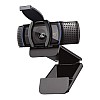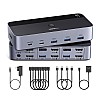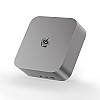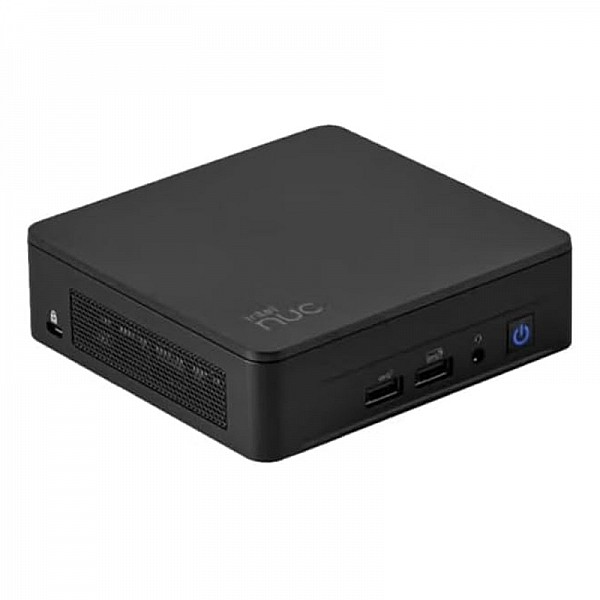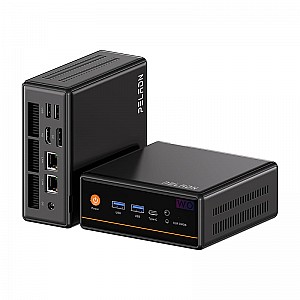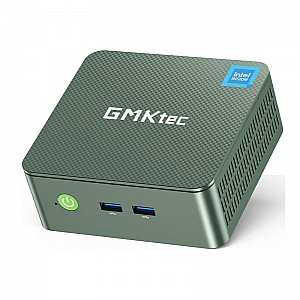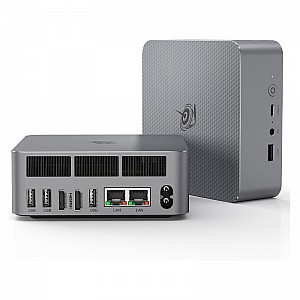Overview
The Intel NUC 13 Pro is the latest iteration in Intel’s NUC lineup, building on the 12th-gen model with minor updates. Meanwhile, the ASRock Industrial NUC Box 1360P/D4 is a third-party competitor using the same 13th-gen Intel processor, aiming to provide a more cost-effective option with lower power consumption. This review compares these units across design, connectivity, cooling, performance, power, and noise levels to help you decide which is the better buy.
Design & Build Quality
Both models feature similar designs with two USB 3.2 Gen 2 (10 Gbps) ports and a headset jack on the front, as well as ventilation on the sides and top. The rear of each device also has a range of connectivity options:
- Intel NUC 13 Pro: Two USB-A 3.2 Gen 2 ports, two Thunderbolt 4 (USB4) ports, two HDMI 2.0 ports, and an upgraded Intel i226 Ethernet port for improved connectivity.
- ASRock Industrial NUC Box 1360P/D4: A similar layout, though it only has one Thunderbolt 4 port and an additional USB-C port that is USB 3.2 Gen 2 but not Thunderbolt-enabled.
One notable feature of the Intel NUC is its additional M.2 SATA slot for extra storage, making it a better choice for users needing multiple storage options. The Intel NUC also feels more refined, with labeled ports and better cooling elements, such as thermal pads and copper heat spreaders inside.
Cooling & Internals
Inside, both devices have two DDR4 3200 SO-DIMM slots and Intel Wi-Fi 6E support. However, the cooling design differs:
- Intel NUC 13 Pro has a copper heat spreader with thermal pads, which provides superior heat dissipation, especially for PCIe Gen 4 SSDs, helping prevent thermal throttling.
- ASRock NUC Box 1360P/D4 lacks this cooling setup, which can cause overheating and performance throttling when using high-speed SSDs.
Performance
Though both devices share the same Intel Core i7-1360P processor with 4 performance cores, 8 efficiency cores, and integrated Intel Xe graphics, the Intel NUC consistently outperformed the ASRock in benchmark tests, especially in sustained workloads. The Intel model maintained a higher power state longer and delivered more consistent speeds, while the ASRock was more burst-oriented, hitting peak power briefly before dropping back to conserve energy.
Power Consumption & Noise
- Intel NUC 13 Pro uses a 120W power supply, consuming around 6-9W at idle and up to 92W under full load. However, this extra power usage translates to higher sustained performance.
- ASRock NUC Box 1360P/D4 uses a smaller 90W power supply and idles at around 11-16W, with peak power around 83W during intense tasks, making it a quieter option.
The Intel NUC is generally louder during heavy workloads due to its higher power draw, reaching up to 45 dB compared to ASRock's quieter 35-40 dB range. However, the extra noise in the Intel model corresponds to better performance, which may be worth the trade-off for users prioritizing speed.
Price & Value
Pricing is expected to be similar for both units, with the Intel NUC potentially retailing around $630-$680. The ASRock may be slightly cheaper and can sometimes include additional memory in the bundle. Ultimately, the difference may come down to tens of dollars, making the Intel NUC’s superior feature set and performance worth considering, even if it’s slightly more expensive.
Final Verdict
Both devices have their strengths:
- Intel NUC 13 Pro is the better all-around option, with faster performance, additional storage options, superior cooling, and more refined design. This model is best suited for users who need consistent, high performance for demanding applications.
- ASRock Industrial NUC Box 1360P/D4 offers lower power consumption, reduced noise, and may be slightly cheaper, making it ideal for users who need a quieter, energy-efficient system for lighter workloads.
For most users, the Intel NUC 13 Pro will likely be the better choice due to its performance and feature advantages. However, if noise and power efficiency are your top priorities, the ASRock NUC is still a viable option.
Description
Intel NUC 13 Pro, Arena Canyon NUC13ANKi7 Mini PC with Core i7-1360P Processor, Intel Iris Xe Graphics, 32GB RAM&1TB NVMe SSD (12C/16T/18M Cache,Up to 5.0GHz) Support 8K/WiFi6E/BT5.3-Win11 Pro
| Brand | Geekplus |
| Operating System | Windows 11 Pro |
| CPU Model | Intel Core i7 |
| CPU Speed | 5 GHz |
| Cache Size | 18 MB |
| Graphics Card Description | Integrated |
| Graphics Coprocessor | Intel Iris Xe Graphics |
| Memory Storage Capacity | 32 GB |
| Memory Slots Available | 2 |
| Specific Uses For Product | Multimedia, Education, Business |
About this item
- 【Small But Powerful Performance】Get the latest in business performance with the 13th Gen Intel Corei7-1360P processor features 12 cores (4P+8E), 16 threads, 18MB Intel L3 Cache, and 35W TDP. Intel NUC 13Pro Mini PCs, Kits, and Boards offer the perfect combination of performance, connectivity, and graphics for a wide range of businesses, school, office and home.
- 【Storage Expansion Option】Intel NUC 13 i7 desktop Mini PC has built-in 32GB DDR4 RAM, 1TB PCle X4 NVMe SSD (Businesses get the fast memory they need with up to 64GB dual-channel DDR4-3200 SODIMMs. Also support up to 2TB of 2.5-inch PCleX4 Gen4 SSD or SATA SSD, not included) that take storage and performance to the next level. You can use the included Vesa bracket to mount the intel nuc 13 mini pc behind a large screen monitor to save even more space.
- 【HD Display Technology & Compact Size】 Intel NUC 13i7 Pro Output 4K@60Hz HD display via DP2.1, HDMI2.1, Thunderbolt4 ports give flexibility to connect up to 4x4K extended displays simultaneously or 8k screen display to work, while processing multiple streams of incoming video via Thunderbolt 4 technology. Built-in 35W Intel Iris Xe Graphics can easily handles 3D animation, CAD models and video rendering, etc
- 【Intel Wireless Technology】 Intel NUC 13 Pro integrated Intel's original network card, Intel Wi-Fi 6E AX211 on M.2 slot, supporting 802.11ax and Bluetooth 5.3 w/internal antennas. Provides higher concurrency, lower latency and greater bandwidth, bluetooth5.2's longer transmission distance, better transmission stability, and lower power consumption.
- 【Rich interfaces】Intel i225 -v 10/100/1000/2500 Mbps RJ45 Ethernet | Discrete TPM 2.0 | 2x front and 1x rear USB 3.2 Gen 2 type A ports ; 1x rear type A and 2x internal USB 2.0 headers | 2x HDMI 2.1 TMDS Compatible (4K@60Hz), with built-in CEC per port; 3.5mm front stereo headset jack | Up to 7.1 multichannel (or 8-channel) digital audio on HDMI and DP type C ports.
- 【AFTER-SALE WARRANTY】 We offer a 3-year warranty, and lifetime worry-free user support. If you have any product concerns, please don't hesitate to contact us, and Geekplus support team will reply and resolve the issue at once.
- 【SUPPORT】If you have a problem about any question, please don't hesitate to contact us, and Geekplus support team will reply and resolve the issue ASAP.
Review from Youtuber


